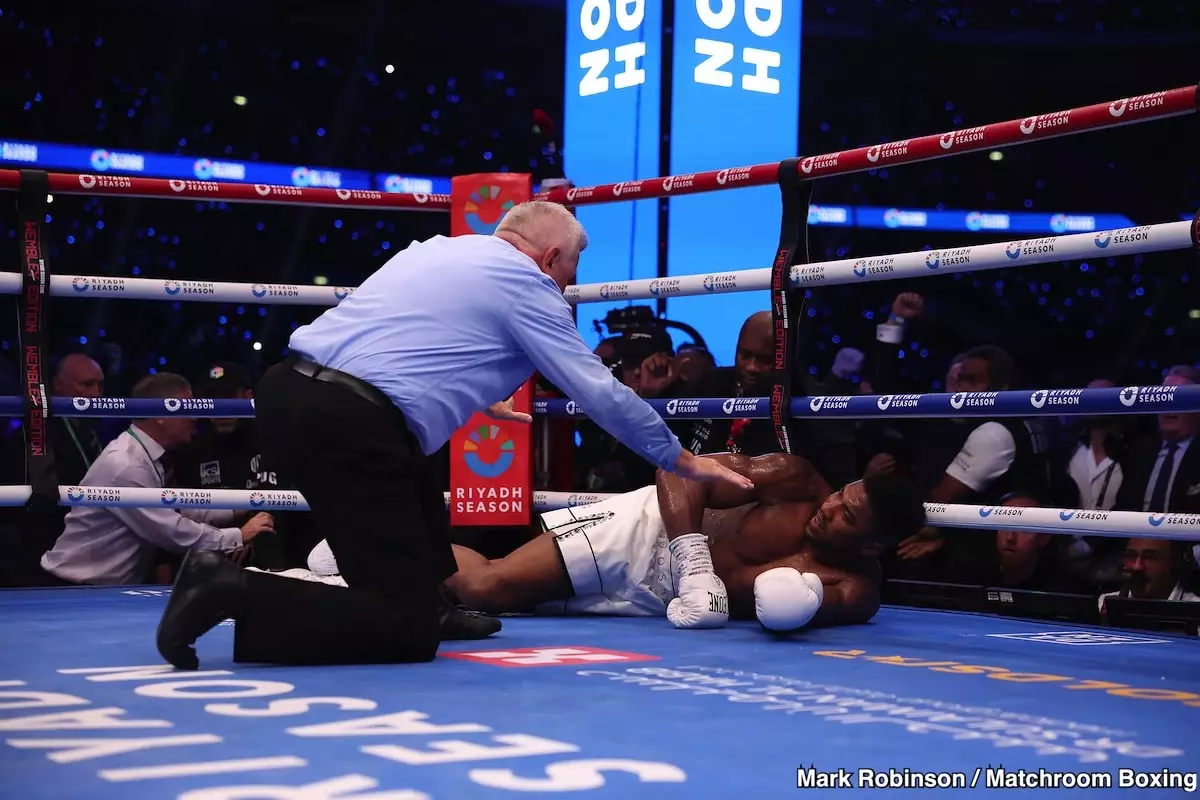The boxing world watched in disbelief as Anthony Joshua faced a shocking defeat against Daniel Dubois in their highly anticipated matchup in London. Once celebrated as Britain’s heavyweight champion, Joshua’s reputation took a hit as he suffered his fourth career loss, raising questions about his future in the sport. Promoter Eddie Hearn, despite the grim outcome, expressed a certain pride in Joshua’s perseverance throughout the bout, signifying that while the result was disheartening, the effort demonstrated by Joshua deserves recognition.
Joshua started the fight as an expected favorite. However, a disastrous first round saw him on the canvas not once, but multiple times, a feat that would send setbacks rippling through his performance in subsequent rounds. This defeat, particularly poignant due to his recent past of championship titles, highlights the harrowing reality athletes face in the ring, where even the most skilled can falter unexpectedly.
The Impact of the Early Knockdowns
According to analysts, the first-round knockdown significantly influenced Joshua’s capacity to recover, rendering him functionally diminished to a mere “30%” of his ability, as Hearn put it. For a fighter of Joshua’s caliber, sustaining such an early blow was catastrophic; it set in motion a series of shortcomings that left him vulnerable. The term “punch resistance” became a critical factor in analyzing Joshua’s performance against Dubois, who capitalized on this weakness with relentless aggression.
Despite being knocked down multiple times, fans took note of Joshua’s remarkable tenacity. His effort to stand up after being dropped four times reflected a warrior’s spirit. After narrowly avoiding a total collapse in the first rounds, Joshua managed to rally somewhat in the middle, showcasing a glimmer of his once formidable abilities by briefly hurting Dubois with a powerful right hand in the third round. Yet, these temporary turnarounds could not compensate for the damage inflicted on him early in the fight.
As the matchup progressed into the later rounds, the optimism for a potential comeback grew. Joshua’s sporadic successes, including moments where he staggered Dubois with solid punches, hinted at the possibility of a turnaround. However, these flames of hope quickly flickered out. Hearn commented on Joshua’s decision to go in for a knockout attempt when he seemed worn out; that decision would prove to be a critical miscalculation. As Joshua rushed in, he was met with another devastating punch from Dubois, sealing his fate and ultimately leading to a concluding knockout that sent shockwaves throughout the boxing community.
Hearn expressed sadness at what he termed “the drama” that unfolded in the ring, emphasizing that the fight offered heart-pounding moments but not in the manner fans and Joshua anticipated. Elements such as improper strategy and a lack of defensive maneuvers compounded the downfall. The aftermath left pundits and fans questioning what it could mean for Joshua moving forward.
The Weight of Expectations
In the sporting realm, the burden of expectation often looms large. Joshua entered this fight carrying the weight of his past victories but also the ever-growing scrutiny of his performance, especially after previous disappointments. Critics were quick to dissect the choices that led to his precarious state, such as his physical preparation. Entering the ring with what seemed to be an excessively muscular build, observers speculated that overtraining or mismanaged conditioning played a part in his downfall against a young, powerful adversary like Dubois.
Furthermore, social media erupted in discourse about Joshua’s future after this defeat. Many fans questioned if the 34-year-old heavyweight could recover, both physically and mentally, after such an intense and brutal fight. Comments ranged from feelings of betrayal to genuine concern for Joshua’s health – highlighting how fleeting glory can be in the rough-and-tumble realm of boxing.
As the dust settles from a profound defeat, the question remains: what is next for Anthony Joshua? Hearn noted that Joshua’s heart and determination were undeniable, yet the brutal reality of the sport must be faced. Moving forward, Joshua may need to evaluate his approach to fighting, focusing on strategy rather than brute strength.
While this chapter has proven challenging for Joshua, it’s crucial to remember that many great athletes face struggles that ultimately define their careers more than their victories do. The road to recovery is long, but if history teaches us anything, it’s that resilience often leads to redemption. Joshua’s future may now seem uncertain, but if he chooses to adapt and grow from this experience, he could emerge a stronger fighter ready to reclaim his place in heavyweight boxing.

